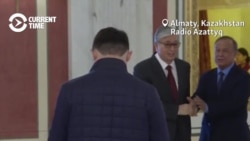Massive detentions of protestors and other citizens marked Kazakhstan's June 9 presidential election, the first in nearly 30 years without former strongman-leader Nursultan Nazarbaev as a candidate. For some opposition supporters, the crackdown suggests that the country’s post-Nazarbaev era will differ little from its past.
Kazakh First Deputy Interior Minister Marat Kozhaev announced at a news briefing after polls closed at 8 p.m. that police had arrested around 500 people in the capital, Nur-Sultan, and in the cities of Almaty and Shymkent throughout the day.
Kozhaev called the detainees “provocateurs” and charged that “radical elements” had organized demonstrations “to destabilize” society.
Journalists, activists, and even ordinary passersby were also scooped up.
Radio Free Europe/Radio Liberty, which runs Current Time in cooperation with VOA, criticized the authorities for briefly detaining two of its Radio Azattyq journalists – Pyotr Trotsenko and Saniko Toiken – and for denying accreditation to seven RFE/RL journalists from the Czech Republic, Russia, and Kazakhstan.
One independent local journalist, Irina Mednikova, stated on Facebook that police did not give reasons for their actions. Kozhaev, however, maintained that officers had strictly followed the law. Three were injured in scuffles with “participants in anti-society movements,” he said.
A second wave of detentions took place in Nur-Sultan in the evening at the site of an unsanctioned protest against the elections. Officials have not stated how many were detained there, although journalists have estimated the number at around 100.
Aside from detentions, on June 9 access was blocked to popular social media such as Messenger, WhatsApp, Telegram, and Facebook, as well as to Current Time’s Russian-language site, among others. Media lawyer Gulmira Birzhanova called the broad switch-off a first for Kazakhstan.
The international Internet-access watchdog NetBlocks told Radio Azattyq that Kazakhstan also blocked VPNs and live streaming on Twitter.
The government has denied any knowledge of this switch-off.
These measures appear linked to its acknowledged effort to stop unauthorized protests against the election by the banned Democratic Choice of Kazakhstan movement – a group the government terms “extremist.”
Former banker Mukhtar Ablyazov, the movement’s self-exiled leader, earlier had called on Kazakhs via social networks to take to the streets on June 9-10 in a “national freedom protest” against the election – a poll that government critics see as scripted to secure the presidency for Nazarbaev’s designated successor, 66-year-old Acting President Qasym-Zhomart Toqaev, a former Senate speaker, prime minister and foreign minister.
Based on an initial exit poll, Toqaev has secured 70.13 percent of the vote. The closest contender among his six rivals, pro-reform politician Amirzhan Qosanov from the United National Patriotic Movement, trails far behind at 15.39 percent.
In an interview with Current Time from London, former Kazakh Prime Minister Akezhan Kazhegeldin, a self-exiled opposition leader who has worked with both Toqaev and Kosanov, questioned those results.
Kazhegeldin asserted that opposition polls and some polling-station protocols his observers received give the lead to Qosanov and that a second round of voting should take place. He saw the 77 percent turnout as “a protest vote” against Toqaev as a continuation of the Nazarbaev government.
Observers stationed in the country’s largest cities have acquired video recordings of election officials stuffing ballot boxes in Toqaev’s favor, he alleged. He did not elaborate further.
Election officials reported that 19 violations, including placing multiple ballots in ballot boxes, have been recorded to date.
Toqaev in April had asserted that Kazakhstan would hold “free, transparent and fair elections” that express “the will of the people.”





